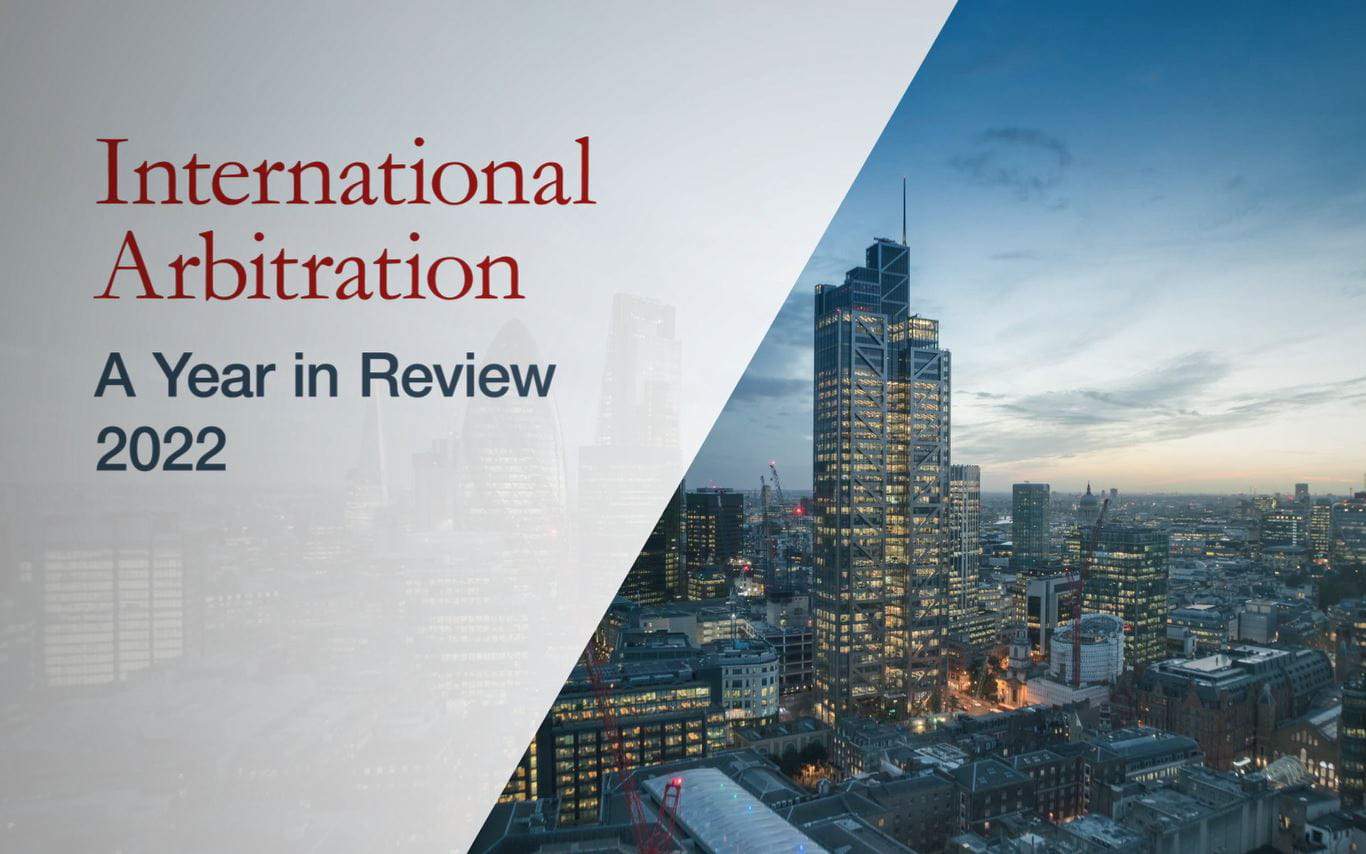

International Arbitration Review 2022
Managing risk and resolving disputes in challenging times
In this publication, members of our Global Arbitration group look back at some of the key developments in 2021 affecting the resolution of complex international disputes and consider their likely impact in the years ahead, and the steps that businesses can take to address them.
This is not, on the whole, a review of individual cases. Rather, we aim to take a high-level view and pick the major changes over the past 12 months which are likely to have a lasting impact.
In what is hopefully a small harbinger of a return to normal life, the effects of the COVID-19 pandemic do not feature in this list. The practice of virtual hearings is no longer a development to note; it is accepted. There has not (yet at least) been a wave of disputes arising directly from the pandemic.
While the pandemic has continued, events have not stopped. Far from it. A number of significant changes have taken place in the arbitration world, which international businesses need to understand and address.
For example, we cover a line of decisions by the Court of Justice of the European Union, which threatens to fatally undermine the legal protection of cross-border intra-EU investments. In a similar vein, we discuss a decision of the Russian Supreme Court, which poses a fundamental danger to international arbitration involving sanctioned Russian parties. We have also seen governments take surprising steps in relation to the use of international arbitration, with the Government of Dubai abolishing by decree a respected and widely used arbitration centre. These are three 2021 developments, which require new approaches to business or deal terms in 2022 and beyond.
We also look more broadly at global developments that will likely lead to new types of disputes, which may require resolution through arbitration. In particular, following COP26 and the commitments made by States to decarbonise their economies to meet the challenge of climate change, there will be a difficult balancing exercise for governments as to how they reduce their reliance on fossil fuels, while observing their commitments under investment protection treaties to protect foreign investors in their energy industries. At the same time as this challenge on Earth, in the skies above, we see a huge rise in commercial activities in Space. This is creating novel risks in an already crowded orbital space, which are anticipated to lead to numerous disputes. These are most likely to find their way to arbitration.
Allen & Overy has continued to invest in our market-leading Global Arbitration group to ensure that we provide our clients with the best advice and support to manage these evolving risks, and efficiently resolve disputes with minimum disruption to their businesses. Our innovative, multi-faceted strategies place the focus on the resolution of disputes, not on the dispute resolution process. In 2021, Gaela Gehring Flores joined our team in the Washington, bringing her distinguished track record of leading winning teams in high-stakes commercial and investment treaty disputes across the Americas. We were also delighted by the promotions to partner of Joanne Lau and Lucia Raimanová in Hong Kong and Slovakia, respectively, as well as the honour bestowed upon London partner Kate Davies McGill, as it was announced that in 2022 she will be appointed Queen’s Counsel.
Read about key trends in international arbitration
States face a complex task balancing investment protection obligations and decarbonisation commitments
More investment treaty disputes are likely to arise from the global energy transition as States reduce their reliance on fossil fuels and introduce ambitious renewables programmes in line with their international commitments.
Read moreSanctions pose an increasing risk to the international arbitration process
Russian Supreme Court rules that sectoral sanctions imposed on Russian entities are a basis to avoid international arbitration agreements in favour of the exclusive jurisdiction of the Russian courts.
Read moreDispute resolution in a vacuum? Arbitration's role in resolving space disputes
The rapid disruption of the space industry and the increasing commercialisation of Earth’s orbit is likely to lead to more disputes, and uncertainty as to how parties should resolve those disputes. Arbitration can play an important role.
Read moreThe rise of construction disputes in investor-state arbitration
Recent years have seen a growing trend of construction disputes being referred to the International Centre for the Settlement of Investment Disputes (ICSID). Construction disputes have accounted for around 15% of new cases registered at ICSID each year since 2017, more than double the previous five years. When construction disputes serve as the basis of treaty claims, it can significantly increase the overall complexity, duration and cost of the dispute.
Read moreArbitration's role protecting intellectual property rights in life sciences disputes
The global pandemic has highlighted the increasing complexity of the life sciences landscape. The need to pursue collaborations to develop new vaccines, treatments and technologies is likely to drive a new wave of disputes, particularly around the protection of intellectual property (IP) rights and trade secrets. International arbitration is well placed to facilitate the resolution of these disputes.
Read moreIs the end of the intra-EU investment arbitration on the horizon?
In 2021, the European Court of Justice (the Court) continued to reshape the landscape for investment treaty arbitration between EU investors and EU Member States - so-called “intra-EU arbitration” - with potentially serious ramifications for both non-ICSID and ICSID awards. With further developments anticipated in 2022, EU investors in other EU Member States should consider (re)structuring their investments through non-EU entities.
Read moreAre states at UNCITRAL on the brink of agreeing the creation of an investment court system to replace investment arbitration?
As discussions at UNCITRAL Working Group III pick up pace, fundamental reforms to investor-state dispute settlement (ISDS) are closer than ever, with a new code of ethics for adjudicators anticipated, in addition to the potential for a multilateral investment court system.
Read moreKey amendments to the ICSID Rules focused on transparency and efficiency go to a vote in 2022
If adopted by ICSID Member States, the first amendments to the ICSID Rules since 2006 will be available for use from July 2022 onward, bringing greater transparency to the process and offering clearer guidance on key issues such as allocation of costs and disclosure of third-party funding.
Read moreIf it ain't broke, don't fix it? The Law Commision's review of the English Arbitration Act 1996
The Law Commission of England and Wales announced in November 2021 that it will carry out a review of the Arbitration Act 1996 (the Act) to ensure that “the UK remains at the forefront of international dispute resolution”. The Commissioner leading the review suggests that the Arbitration Act 1996 “could be improved in light of modern arbitration practices”, which “will enhance the experience for those who choose to arbitrate in England”.
Read moreDubai Government Decree abolishes the DIFC Arbitration Institute impacting current and future DIFC-LCIA arbitrations
Dubai Decree No. 34 of 2021 (the Decree), which came into force on 20 September 2021, impacts current and future DIFC-LCIA arbitrations. All arbitration users in the region will have to take its effect into account in determining how to resolve their disputes as we move into 2022.
Read moreArbitration awards: A new asset class
Secondary market players show a growing appetite for acquiring rights to the proceeds of international arbitration awards. The sale and purchase of arbitration awards make commercial sense for both the award‑creditor and the buyer. However, these transactions raise novel practical and legal issues to consider, over which arbitration practitioners can advise.
Read moreDownload the International Arbitration Review

Allen & Overy’s International Arbitration group
Our International Arbitration group advises a diverse range of corporates, financial institutions and governments on complex cross-border commercial and investment treaty arbitrations.
With specialist arbitration practitioners, including leading advocates, in all the key arbitral jurisdictions globally, we advise on the most pressing and complex disputes wherever they arise. Our global expertise is combined with regional expertise in disputes involving the Americas, Europe, the Middle East, Africa and Asia-Pacific.
A&O’s international arbitration expertise spans the full range of sectors in which arbitration is used, including:
- Energy and Natural Resources
- Construction and Infrastructure Projects
- Telecommunications & Life Sciences
- Banking and Finance
- Intellectual Property Rights
- M&A and Joint Ventures
Representing clients in arbitrations under all the key rules, including the ICC, LCIA, HKIAC, SIAC, ICSID and UNCITRAL Rules, our specialist practitioners around the world are qualified in many jurisdictions and fluent in numerous languages. Senior members of our team regularly sit as arbitrators and hold key positions with the leading arbitral institutions, legal associations and academic faculties.
We advise our clients at every step of the process and typically conduct our own advocacy in clients’ arbitration cases, delivering cost savings and ensuring our advocates are involved from the very start of proceedings. Our approach to the conduct of matters is always informed by our clients’ commercial interests and strategic objectives.



